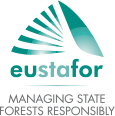EU Bioeconomy Strategy to be reviewed
The EU Bioeconomy Strategy is under review this year. “As forests and related industries have always been an important part of the bioeconomy, we cannot even imagine what new innovations and products such as bioplastics can bring,” said Waldemar Kütt, Head of Unit in DG Research of the European Commission.
Mr. Kütt presented perspectives on the bioeconomy in Brussels at the meeting “Forest-based Bioeconomy and EU´s Bioeconomy Strategy.” The meeting was hosted by MEP Miapetra Kumpula-Natri, on 1 June 2017, and organized by the European Parliament Intergroup on “Climate Change, Biodiversity and Sustainable Development.”
Mr. Kütt also pointed out the importance of wood construction for bioeconomy, as healthy living, climate benefits and safety issues all speak for wood construction.
The Bioeconomy Strategy review has been marked by the Circular Economy Action Plan in 2015 and the conclusions of the Environmental Council last summer. Meanwhile, numerous EU member states have also finalized their national bioeconomy strategies or are in the process of doing so.
The EU Council’s conclusions on the Bioeconomy Strategy are expected next winter or spring, as is the final decision on the revision/update of the strategy. The strategy review will be highlighted in a separate bioeconomy conference in Brussels on 16 November 2017.
State forests boost the bioeconomy
At the same meeting, Ciarán Fallon, Director of Stewardship, Risk and Communications at Coillte, Ireland, spoke on the important role of state forests in the bioeconomy. “State forests are forerunners in sustainable forest management, providing a stable and sustainable source of raw materials for the bioeconomy and delivering a large set of other ecosystem services.” State forests provide about 30 % of the total timber harvested in the EU. Forest resources are continuously growing because state forest organizations harvest only some 2/3 of the annual increment.
“The advanced bioeconomy will involve deep learning, research and innovation. State forests are a predictable partner and EUSTAFOR’s members are large enough to engage meaningfully in research. We are also always ready to share our expertise with decision makers and stakeholders in working towards a new policy landscape framed by sustainable development goals, the bio- and circular economies as well as the climate and energy policy objectives,” said Mr. Fallon.
Published 09/06/2017

